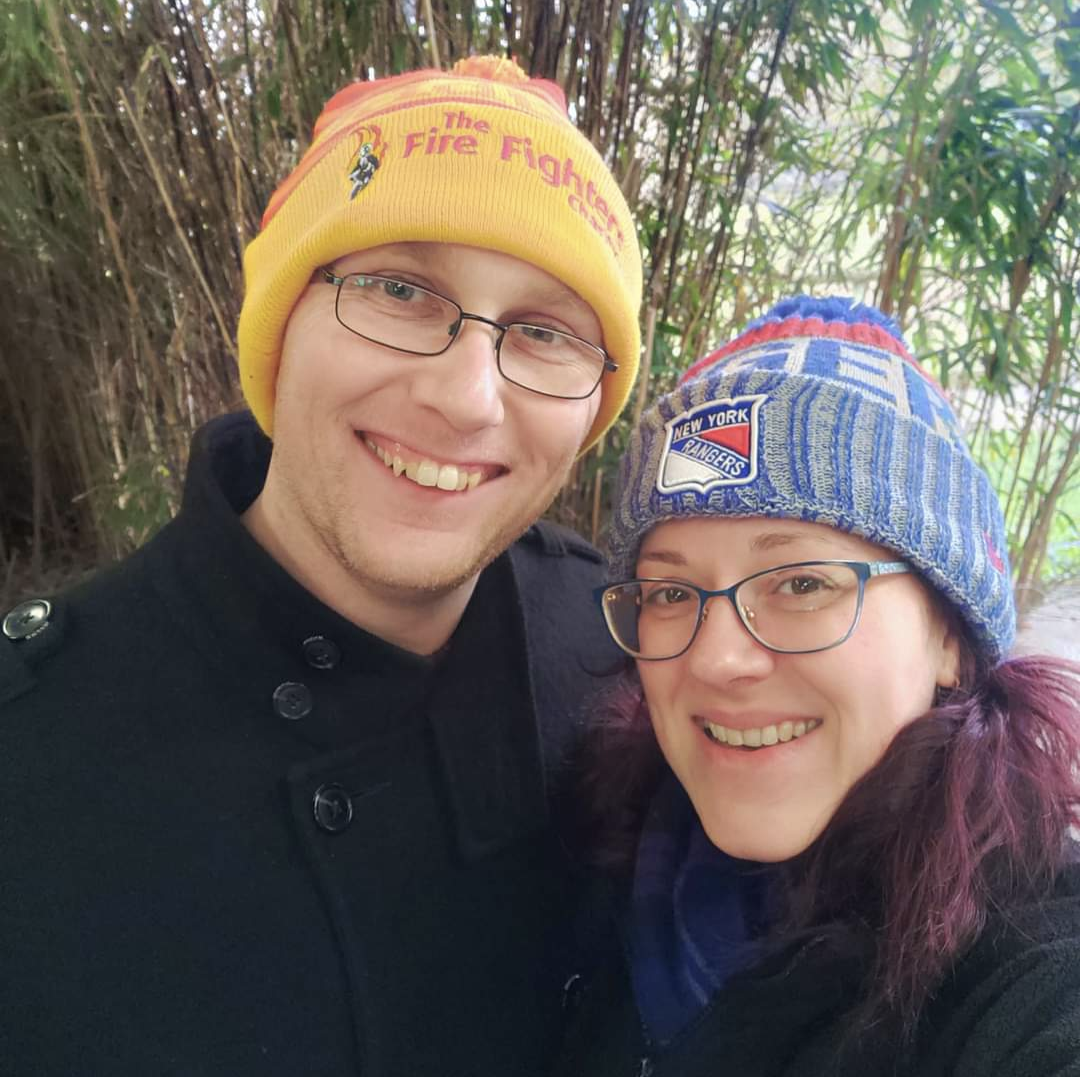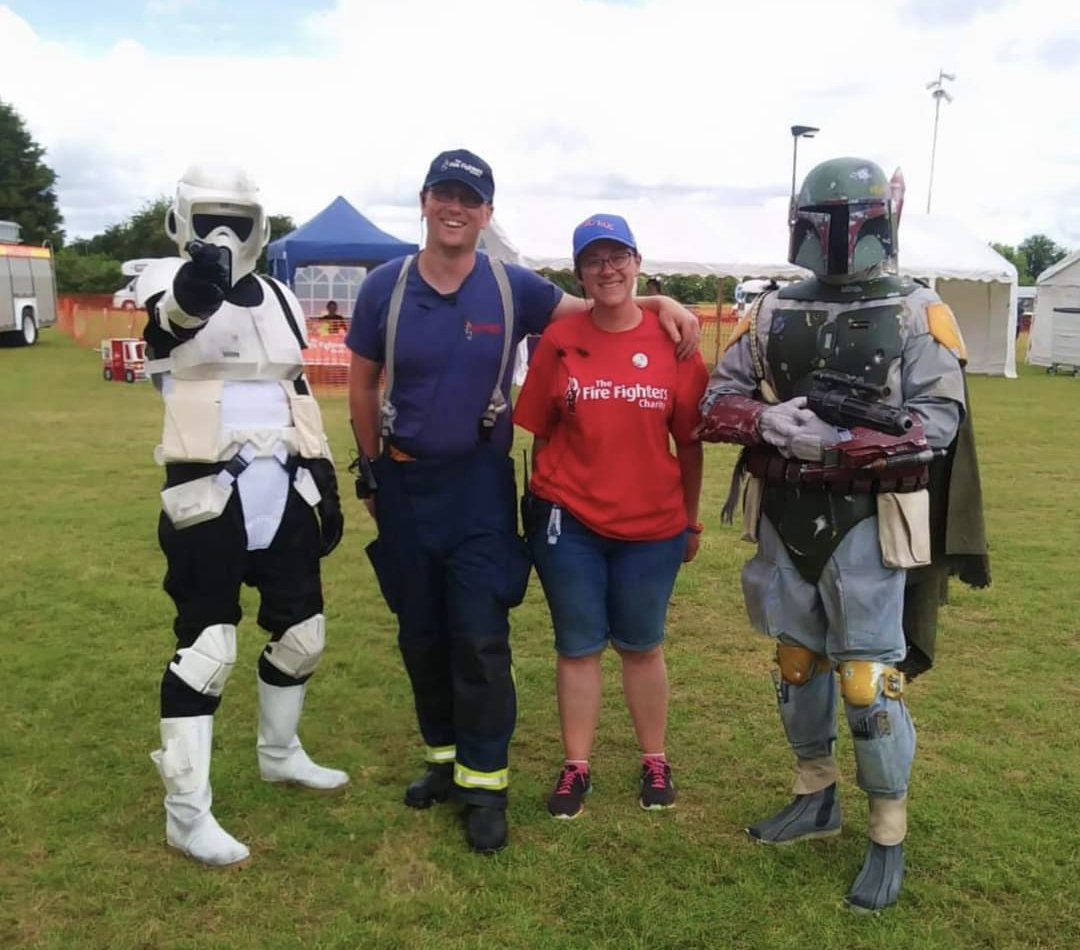When George Lee visited his GP due to some abnormal pain, the last thing he expected to hear was that he had testicular cancer.
Fortunately for him, they’d caught it in time, and he’s been recovering ever since – but he wants to spread an important message to all men following his experience: get checked, it could save your life.
George works in a support role with Cambridgeshire Fire and Rescue and is now preparing to attend our Living Healthily After Cancer Week in December, having previously visiting Harcombe House on a Rest and Recharge stay with his partner, Caz.

“I’ve been aware of the charity for it must be at least 15, 20 years. I used to be a fire cadet back in 2005-2007,” he says. “Myself and my family have got a miniature steam engine too, so we’ve given rides at fire station Open Days or even on a steam rally. And any money we raised was for the charity.”
Speaking about his cancer journey, George tells us “I was diagnosed with testicular cancer in April 2021. It wasn’t the usual way of finding out…
“I had varicose veins which cause pain every so often, but it usually subsides after a week. It happened again and I left it for a week, but then as the pain hadn’t subsided it was like right, okay, let’s check myself. Something wasn’t right.

“I’d done the old Google which largely said the warning signs were any lumps, bumps or swelling, and I hadn’t got any of that, which was even worse. Mine was just firm, hadn’t changed in size or anything. So, because there wasn’t anything online, it was just easier to go to my GP and go from there.
“To be fair to them, they were very, very quick. I went on the 12th of April, and by the 28th of April I had the operation to remove it all.
“With my testicular cancer, they couldn’t test to say if it’s just a tumour or cancerous, so the easiest thing that they could do was just remove it and then test afterwards. With testicular cancer, it can spread very, very quickly, so time is of the essence.

“Luckily for me, they said that if I’d waited another two weeks, I’d have ended up having to go through chemo and radiotherapy and all the rest of it. It’s very, very quick and aggressive. So, the quicker you can get in and get sorted, the better.”
George also wants to reassure anyone going to get tested that it’s nothing to worry about.
“GPs who you normally see, whether that’s male or female, they’ve seen it all before,” he says. “It’s the mentality of men… it’s not talked about enough. Please, if you notice any sort of change, I highly recommend getting checked. You’re not wasting their time, at the end of the day, you’re potentially saving your life.”

Recalling how he initially coped when he heard his tumour was cancerous George says he relied heavily on medical professionals and his partner, Caz.
“Both my partner and my GP have stuck with me all the way through,” he says.
“I remember my GP told me, ‘don’t try and take in all the information, just go with the system because you’ll get lost in it all, we know what we’re doing’. And in fairness, that was the best thing that could have happened. And because they’re so quick with it, you haven’t got the time to sort of process it until afterwards.”
George’s procedure was day surgery and he had a month off work, as he was in a different role at the time which required a lot of heavy lifting.
Asked his motivation for sharing his experiences, George says: “I just think, if I can just help even one person, that’s better than nothing. Despite how aggressive it is, and how common it is in men, we don’t really hear too much about it. It’s slowly coming round because more and more people are unfortunately getting it.”

George says his own procedure went well. However, in some cases it can impact hormone levels, and for him he’s now living with hot flushes and some fatigue, which he’s finding ways of coping with.
He’s also signed up to our Living Healthily After Cancer Week in December 2024, where he’ll meet others who have been through cancer and learn tools to cope with the aftermath and recovery.
As a final word to anyone reading, George says: “I do find, if I’m honest, it’s easier to talk to people that aren’t emotionally attached to yourself, because you tend to keep certain things from your partners, from family and all the rest of it because you know full well it will upset them.
“So I do think it is easier to talk to either friends or other networks, like the charity or other sources that are out there.”
George also shares his experience in an episode of our Shout! Podcast. You can listen here.
If you feel you’d benefit from our health and wellbeing support, you can call our Support Line on 0800 389 8820, make an enquiry online or visit the ‘Access Support’ tab in My Fire Fighters Charity.
And remember – if you’re feeling suicidal, you can call our Crisis Line 24 hours a day on 0300 373 0896.

